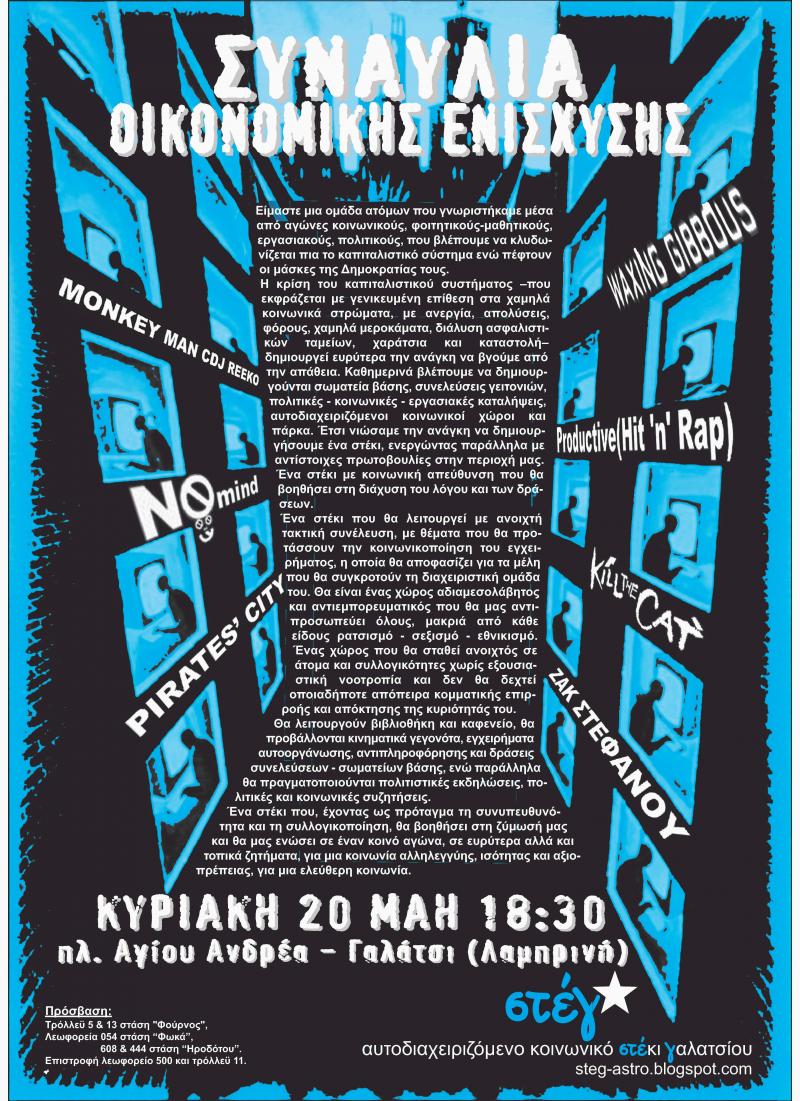
Campaign to exercise the right to access European databases
Throughout Europe, the data of millions of people is stored in information systems operated and checked by the police and and intelligence services as a matter of course. The various national systems are supplemented by centralized databases such as the Schengen Information System (SIS) and databases operated by Europol. In addition, the Treaty of Prüm and the "Swedish Initiative" has led to increasing automation and facilitate rapid data exchange between national systems.
We are no longer talking only about persons convicted for criminal offences. Immigrants are regularly entered in these databases – for having committed the “crime” trying to enter in a European country without obtaining prior permission, for wishing to make use of their right of asylum, or even for simply being a guest for a longer period in a European Union member state. But it is not just immigrants either. EU citizens are finding themselves entered in data retention systems for something as simple as, for example, being caught up in an ID check at a political demonstration or as a result of being ordered by the police to vacate a premises.
Facing a total “flood of information”, the interior ministers of several European countries are calling for the police authorities to be given even more powers and the technical capabilities necessary to make use and explore this “data tsunami”. “Data mining” software should simplify data analysis and provide “decision support”. Data on persons, objects and their relations is processed to be able to identify “risks” and “predict” crime and unrest even before it happens. Naturally, the relevant software is developed by the security industry, its source code and therefore its functionality kept secret.
The creation of a cross-border information network, which should “extend as far as the USA”, together with the development of technical platforms for real-time cooperation between the police authorities is one of the top priorities for European interior ministers. With the "Stockholm Programme", due to be passed by the European Council in December 2009, these plans will officially become the rule for EU domestic policy over the next five years. Critics are warning of a “database society”.
As it becomes increasingly easy to exchange police data within the Single European Market, those who are actually affected generally have neither knowledge of nor control on the collection, processing and circulation of the data. Data protection does not figure highly in European police cooperation; a set of common standards is kept to a minimum. Issues of proportionality or prescribed data storage periods are generally ignored. Basically, what goes is what the respective national law lets you get away with. Even where a European watchdog exists, the interior ministers and police authorities have the last word. The people concerned might even find themselves having to enforce their claim to international legal protection far away from their place of residence.
Thus the danger is the normalization of uncontrolled storage and cross-referencing of data collected in one country to be continued by another country. Higher data protection standards of one country can be easily bypassed by clever officials going through countries with lower standards. And there is a very real risk of both a huge accumulation of maximum amounts of data in centralised “data warehouses”, whose sole purpose it is to enable computer-aided search for information, and the comparison of databases becoming the daily norm .
All this not only increases the potential for data abuse. More importantly, through cross-border police cooperation, the origin and reliability of data will become even less transparent than it already is today in the national context. A false “hit" made by a researching official during police investigation in the European information network can have grave consequences: from covert surveillance to the tracking of one’s movements, temporary detainment to being refused the right to enter or leave a country, deportation, house searches, interrogations, and so on. It is then up to the affected persons to prove their innocence. To rid oneself of the suspicion and mistrust that undermines personal and civil liberties, in serious cases one is forced to take expensive and exhausting legal action. And we know: even having contact with people suspected by the police or a "tiny remaining suspicion" justifies data storage.
Therefore, in response to these ominous developments, we call on all those who share our concerns to join the campaign against the “Stockholm Programme”. This means not just informing yourself and others, but also taking specific action and exercising your rights.
The switchboards for the cross-border exchange of information are central police authorities of the respective EU member state. Amongst other things, these serve as a national point of contact for the European Police Office (Europol) and its corresponding computer systems, for the Schengen Information system and for the exchange of information conducted within the scope of individual bilateral and multilateral agreements. However, the central police authorities are also obliged to provide information on data that might be stored there.
So to anyone who would like to know what the police (think they) know about you, or simply to register your dissent, we recommend exercising your right to access your own data by sending a request for information to the relevant police authority in your country. The digest received in response will help to give us an idea of the full extent of police access to citizen data, as well as serving as a starting point for getting your data out of the computer systems, by legal or political means.
Instructions on how to contact your local SIRENE office can be found on http://euro-data.noblogs.org. For requests in Germany, we have prepared a document generator at http://www.datenschmutz.de/cgi-bin/moin.cgi/AuskunftErsuchen.
For more information on the future plans of the European ministers of interior and justice, see http://stockholm.noblogs.org.
Nimm dir dein Recht im Europa der Polizeien, hol dir deine Daten zurück!
Kampagne zu Auskunftsersuchen in europäischen Datenbanken
Europaweit sind personenbezogene Daten von Millionen von Menschen in Informationssystemen gespeichert, die von Polizei oder Geheimdiensten betrieben oder selbstverständlich abgefragt werden. Ergänzt und vernetzt werden die diversen nationalen Informationssysteme durch zentralisierte Datenbanken, wie das Schengen-Informationssystem (SIS) oder Europols Computersysteme, und die wachsende Automatisierung und Beschleunigung des grenzüberschreitenden Datenaustausches im Gefolge des Vertrages von Prüm und der „Schwedischen Initiative“.
Betroffen sind längst nicht nur Personen, die wegen einer Straftat rechtskräftig verurteilt sind. Regelmäßig erfasst werden MigrantInnen – sei es, weil sie das „Verbrechen“ begangen haben, sich ohne vorherige Bewilligung im europäischen Wohlstandsraum aufzuhalten, weil sie vom Asylrecht Gebrauch machen wollen oder auch nur, weil sie länger in einem Mitgliedstaat der Europäischen Union zu Gast sind. Aber auch EU-BürgerInnen werden immer häufiger ohne strafrechtlichen Anlass, z.B. allein wegen einer Kontrolle bei politischen Protesten oder aufgrund eines polizeilichen Platzverweises, auf Vorrat gespeichert und somit zum Sicherheitsrisiko erklärt.
Europäische InnenministerInnen fordern angesichts einer „immensen Datenflut“ mehr Kompetenzen und die technischen Voraussetzungen zur Nutzbarmachung dieses „Daten-Tsunami“ für die Polizeibehörden. „Datamining“-Software soll die Auswertung der Datenbestände vereinfachen und „Entscheidungshilfen“ geben. Personen-, Sach- und Beziehungsdaten werden von Computern prozessiert, die „Risiken“ frühzeitig erkennen und etwaige Straftaten „vorhersehen“ sollen. Die Software hierzu wird von der Sicherheitsindustrie entwickelt, ihr Quellcode – und damit ihre Funktionsweise – bleibt geheim.
Die Schaffung eines grenzenlosen Informationsverbundes – der bis in die USA reichen soll – sowie die Entwicklung von technischen Plattformen für die Zusammenarbeit der Polizeibehörden in Echtzeit gehört zu den obersten Prioritäten der europäischen InnenministerInnen. Mit dem „Stockholm Programm“, das der Europäische Rat im Dezember verabschieden will, sollen die Pläne offiziell zur Richtschnur für die EU-Innenpolitik der kommenden fünf Jahre werden. KritikerInnen warnen vor einer „Datenbank-Gesellschaft“.
Während der Binnenmarkt für den polizeilichen Datenaustausch immer stärker Kontur gewinnt, entziehen sich die Erfassung, Verarbeitung und Weitergabe der Daten in der Regel der Kenntnis und dem Einfluss der Betroffenen. Datenschutz wird in der europäischen Polizeizusammenarbeit klein geschrieben: Gemeinsame Standards bewegen sich auf minimalem Niveau. Fragen der Verhältnismäßigkeit von Datenerfassung oder Speicherfristen werden meistens ausklammert. Erlaubt ist im Prinzip, was das jeweilige nationale Recht hergibt. Selbst dort, wo es europäische „Kontrollinstanzen“ gibt, haben Innenministerien und Polizeibehörden das letzte Wort. Internationaler Rechtsschutz muss von Betroffenen im Ernstfall weit jenseits des Wohnortes erstritten werden.
Damit droht die Normalisierung der unkontrollierten Speicherung und Anreicherung von Daten, die in einem Land erhoben wurden, durch die Sicherheitsbehörden eines anderen Landes. Höhere Datenschutzstandards bestimmter Länder können durch findige BeamtInnen über Länder mit niedrigeren Anforderungen umgangen werden. Und es drohen die Anhäufung einer größtmöglichen Menge von Daten in zentralen „Data Warehouses“, deren Zweck einzig und allein ihre Durchforstung nach der Methode der Rasterfahndung ist, sowie die Veralltäglichung standardisierter Abgleiche großer Datenbestände.
Gesteigert wird dadurch nicht nur das Potenzial für den Missbrauch der Daten. Vielmehr werden die Herkunft und Glaubwürdigkeit der Daten im Alltag grenzüberschreitender Polizeikooperation auch für wohlmeinende BeamtInnen noch weniger transparent sein, als sie es im nationalen Kontext bereits heute sind. Die Konsequenzen falscher „Treffer“ polizeilicher Recherchen im europäischen Informationsverbund können allerdings gravierend sein: verdeckte Überwachung zur Erstellung von Bewegungsprofilen, vorläufige Festnahmen, Aus- und Einreiseverbote, Abschiebung oder auch „nur“ lästige Hausbesuche und Vernehmungen durch ErmittlerInnen – die Last, die eigene Unschuld zu beweisen, obliegt den Betroffenen. Der Freispruch vom nagenden Verdacht, der persönliche Freiheit und zwischenmenschliches Vertrauen unterminieren kann, muss notfalls mühselig auf dem Rechtsweg erkämpft werden – falls die persönliche Lebenssituation dies überhaupt zulässt. Und wir wissen ja: selbst der „Kontakt“ zu Verdächtigten oder ein kleinster „Restverdacht“ rechtfertigen eine Speicherung.
Als Antwort auf diese bedrohliche Entwicklung rufen wir daher all jene, die unsere Sorgen teilen, im Rahmen der Kampagne gegen das „Stockholm-Programm“ dazu auf, nicht nur sich selbst und andere zu informieren, sondern konkret in Aktion zu treten und von ihren Rechten Gebrauch zu machen:
Nadelöhre des grenzüberschreitenden europäischen Informationsaustausches sind (noch) die zentralen Polizeibehörden der EU-Mitgliedsstaaten – in Deutschland das Bundeskriminalamt (BKA). Das BKA ist nicht nur die nationale Kontaktstelle für das europäische Polizeiamt Europol und seine Computersysteme, für das Schengen-Informationssystem und für den Informationsaustausch im Rahmen bi- und multilateraler Vereinbarungen; das BKA ist auch verpflichtet, Auskunft über eventuell gespeicherte Daten zu geben.
Wer also wissen will, was die Polizei über sie oder ihn zu wissen glaubt, und wer sie damit beschäftigt sehen möchte, Auskunft über die Speicherungen ihrer bzw. seiner Daten in ihren Datenbanken zu geben, dem empfehlen wir, sogenannte Auskunftsersuchen zu stellen. Die Antworten werden Hinweise über das Ausmaß des polizeilichen Zugriffs auf die Bevölkerung geben und können Ausgangspunkt für individuelle Anträge auf Löschung und politischen Widerspruch sein.
Weitere Informationen und das Angebot einer automatisierten Erstellung entsprechender Anschreiben finden sich unter http://www.datenschmutz.de/cgi-bin/moin.cgi/AuskunftErsuchen.
Mehr zu den zukünftigen Plänen europäischer Innen- und Justizminister: http://stockholm.noblogs.org.
Campagne pour un accès aux banques de données
Dans l’Etat de police européenne: récuperes tes données personelles!
A travers l’Europe, les données personelles de millions de personnes sont collectées dans des systèmes d’information gérées et évidemment utilisées par les services secrets et de police. Les differents sytèmes nationaux sont en ceci assistées par des banques de données centralisées tel que les Systèmes d’information de Schengen (SIS) ou ceux d’Europol. De plus, le traité de Prüm et „l’Initiative suedoise“ ont augmenté et facilités l’échange rapide automatique de ces données entre les systemes nationaux.
Nous ne parlons plus de personnes condamnées pour crime. Les données des immigrants sont régulierement inscrits dans ces bases pour avoir commis le „crime“ d’essayer d’entrer dans un pays européen sans en avoir demandé l’autorisation auparavant et pour avoir voulu obtenir le droit d’asyle ou meme pour avoir visité un Etat membre de l’Union Européenne pour une période plus longue. Mais cela ne concerne pas seulement des imigrants. Les citoyens de l’UE se retrouvent également fichés dans ce système de rétentions de données pour un fait aussi banal qu’un controle d’identité sur une manifestantion politique.
Submergés par sette marée d’informations, les ministres de l’int é rieur de plusieurs Etats appellent à ce que plus de pouvoirs et de capacités techniques soient données aux forces de police, afin que celles-ci puissent explorer et analyser ce „Tsunami de données“.
Les logiciels de “Data mining” sont sensé simplifier l’analyse de données et fournir un „support dans la prise de décision“. Le traitement de ces données sur des personnes ou des objets et leurs relations permet d’identifier au préalable les „risques“ et de „prédire“ des crimes ou des agitations sociales. Naturellement c’est l’industrie sćcuritaire qui développe ces importants logiciels, dont le fonctionnement et les données techniques sont gardés secrets.
Une des priorités des ministres intérieurs eruopéens est le développement de plateformes techniques de coopérations en temps réel entre les services de police et la mise en place d’un réseau d’échange international d’informations qui s’étendrait jusqu’aux Etats-Unis. Le "Stockholm Programme" qui a été validé par le Conseil de l’Europe en Décembre 2009 sera la ligne directrice de la politique intérieure des Etats membres pour les cinq années à venir. Les critiques alertent sur les risques d’une „société de fichage“.
Alors que l’échange des données est facilité au niveau européen, les personnes concernées ont en géneral peu de controle sur la collecte et un manque de conaissances sur la manière dont leurs données circulent et sont utlisisées. La protection des données ne joue quasiment aucun role dans la cooperation des polices européennes; des standards communs sont conservés à minima. En général la durée de conservation des données sont ignorées, ainsi que la proportion de leur emploi. Le cadre juridique national sert généralement de réference. Même dans les cas ou une instance de controle européenne existe, les ministres de l’intérieur et les authorités de police ont le dernier mot. Les personnes concernées doivent en général se battre pour leurs droits loin de leurs lieux de résidence.
Le danger consiste dans la normalisation du stockage incontrollé et du croisement de données d’un pays à l’autre. Des standards de protection plus élevés peuvent être facilement contournés par des officiels futés en passant par un pays avec des standards moins élevés. Il-y-a un risque réel d’ immenses accumulations de données centralisées dans des „entrepôts de données“ dont le seul but est de rendre possible la recherche d’information assistée par ordinateur et la comparaison quotidienne des bases de données.
Ceci n’augmente pas seulement le risque d’abuser de ces données. La coopération trans-frontalière des forces de police va surtout rendre l’origine et la crédibilité de ces données moins transparente qu’elle ne l’est déjà dans le contexte national.
Une erreur faite par un agent de police durant une investigation s’appuyant sur le réseau d’information européen peut avoir de graves conséquences allant d’une filature à la traque des mouvements d’une personne, passant par des arrestations provisoires au refus du droit de rentrer ou quitter un territoire, aux expulsions ou „seulement“ aux perquisitions et interrogatoires: A vous de prouver votre innocence. Souvent des actions très chères et compliquées sont nécessaires pour se débarasser des suspitions et accusations mettant en péril les libertés civiles et personelles. Et l’expérience nous montre: même avoir été en contacte avec des personnes suspectées par la police ou un „doute minime restant“ justifie la conservation de données.
En réponse à ce développement nous appellons toutes celles et ceux qui partagent notre critique à joindre notre campagne contre le „Programme de Stockholm“, non seulement en partageant ces informations mais aussi en menant des actions spécifiques et en exercant vos droits.
Les lieux de commutation de l’échange international de ces informations sont les autorités de police respectives des états membres. Entre-autre elles servent comme réference nationale pour Office européen de la Police (Europol) et ses systèmes informatiques correspondants pour le système d’information de Schengen ainsi que pour l’échange d’informations dans le cadre de coopérations bi- ou multilaterales. Les autorités de police sont aussi obligés de mettre à disposition les données stoquées.
Pour toutes celles et ceux qui voudraient savoir ce que la police (pense) savoir sur eux, nous appellons à exercer votre droit d’accès sur vos propres données en envoyant une requête d’information aux autorités responsables dans votre pays. Les réponses recues nous permettront d’avoir une idée de l’extension réelle de l’accès par la police aux données des citoyens. De plus ce serait un point de départ pour voir retirés les données des systèmes informatisés par voie légale ou politique.
Pour trouver et contacter l’office SIRENE, consultez: http://euro-data.noblogs.org.
Pour plus d’informations sur les plans à venir des ministres intérieurs et de justice, consultez http://stockholm.noblogs.org.














![Eurorepressione - Sulla conferenza a Den Haag sul tema "Anarchia" [corretto]](http://25.media.tumblr.com/tumblr_m0jvngOXtY1qa2163o1_1280.jpg)




![A tres años de la Partida de Mauricio Morales: De la Memoria a la Calle [Stgo.]](http://metiendoruido.com/wp-content/uploads/2012/05/mmacividad.jpg)



















Nessun commento:
Posta un commento